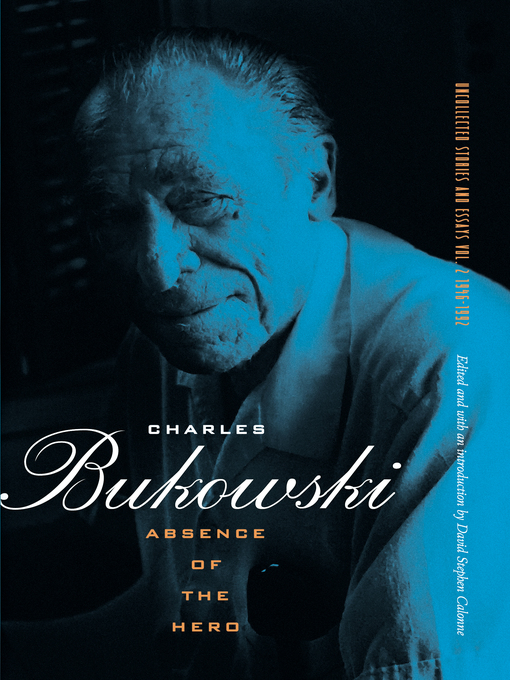Everyone's favorite Dirty Old Man returns with a new volume of uncollected work. Charles Bukowski (1920–1994), one of the most outrageous figures of twentieth-century American literature, was so prolific that many significant pieces never found their way into his books. Absence of the Hero contains much of his earliest fiction, unseen in decades, as well as a number of previously unpublished stories and essays. The classic Bukowskian obsessions are here: sex, booze, and gambling, along with trenchant analysis of what he calls "Playing and Being the Pet." Among the book's highlights are tales of his infamous public readings ("The Big Dope Reading," "I Just Write Poetry So I Can Go to Bed with Girls"); a review of his own first book; hilarious installments of his newspaper column, Notes of a Dirty Old Man, including meditations on neo-Nazis and driving in Los Angeles; and an uncharacteristic tale of getting lost in the Utah woods ("Bukowski Takes a Trip"). Yet the book also showcases the other Bukowski—an astute if offbeat literary critic. From his own "Manifesto" to his account of poetry in Los Angeles ("A Foreword to These Poets") to idiosyncratic evaluations of Allen Ginsberg, Robert Creeley, LeRoi Jones, and Louis Zukofsky, Absence of the Hero reveals the intellectual hidden beneath the gruff exterior.
Our second volume of his uncollected prose, Absence of the Hero is a major addition to the Bukowski canon, essential for fans, yet suitable for new readers as an introduction to the wide range of his work.
"He loads his head full of coal and diamonds shoot out of his finger tips. What a trick. The mole genius has left us with another digest. It's a full house—read 'em and weep."—Tom Waits
"This second volume of Bukowski's uncollected stories and essays offers all that Bukowski is known for—wry obscenity, smutty wisdom, seeming ramblings whose hidden smarts catch you unaware—but in addition there are moments here in which he takes off the mask and strips away the bravado to show himself at his most vulnerable and human. A must for Bukowski aficionados."—Brian Evenson, author of Last Days and The Open Curtain
"Like a brass-rail Existentialist or a skid-row Transcendentalist, [Bukowski] is candid, unblinking, leaving it to his readers to cast their own judgment about his mishaps, his drinking, his sexual appetite or his own pessimism. He is Ralph Waldo Emerson as a Dirty Old Man, not lounging in the grape-arbor of Concord, Massachusetts, but bent-over a table in an L.A. flophouse scribbling in pencil to the strains of Sibelius."—Paul Maher Jr., Phawker
"[Bukowski] could be generous and mean-spirited, heroic and defensive, spot-on and slanted, but he became the world-class writer he had set out to be; he has joined the permanent anti-canon or shadow-canon whose denizens had shown him the way. Today the frequent allusions to him in both popular and mainstream culture tend more to respect than mockery. If scholarship has lagged, this book would indicate that this situation is changing."—Gerald Locklin, Resources for American Literary Study
"The pieces range over nearly half a century, and include a story about a baseball player seized by a sudden bout of existential paralysis, along with early, graphically sexual (and masterfully comic) stories published in such smut mags as Candid Press."—Penthouse
